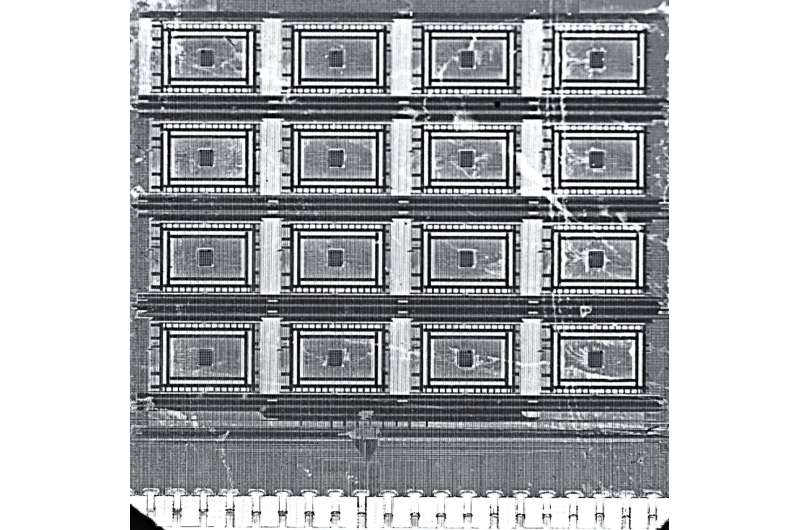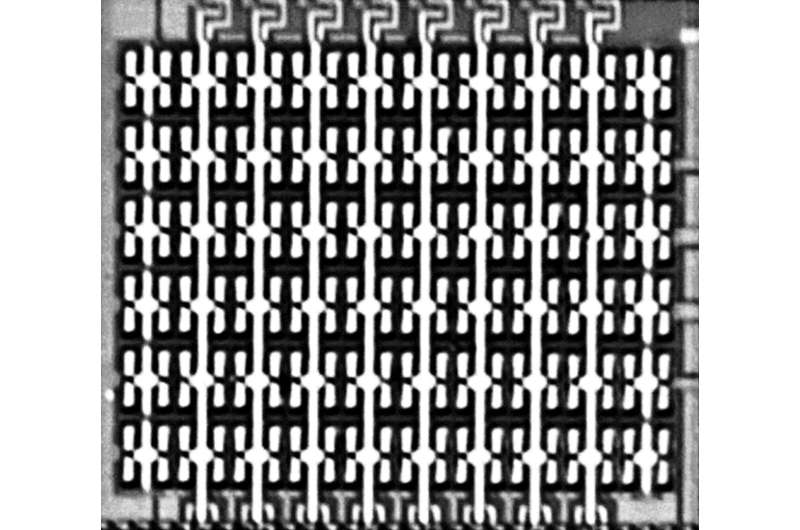
Over the past few decades, the performance of machine learning models on various real-world tasks has improved significantly. Training and implementing most of these models, however, still requires vast amounts of energy and computational power.
Engineers worldwide have thus been trying to develop alternative hardware solutions that can run artificial intelligence models more efficiently, as this could promote their widespread use and increase their sustainability. Some of these solutions are based on memristors, memory devices that can store information without consuming energy.
Researchers at Université Paris-Saclay- CNRS, Université Grenoble-Alpes-CEA-LETI, HawAI.tech, Sorbonne Université, and Aix-Marseille Université-CNRS have recently created a so-called Bayesian machine (i.e., an AI approach that performs computations based on Bayes’ theorem), using memristors. Their proposed system, introduced in a paper published in Nature Electronics, was found to be significantly more energy-efficient than currently employed hardware solutions.
“Artificial intelligence is making major progress today but faces a challenge: its considerable energy consumption,” Damien Querlioz, one of the researchers who carried out the study, told TechXplore. “It is now well understood that this consumption comes from the separation, in computers, between computation and memory functions. As artificial intelligence uses a lot of data, it requires a lot of memory, which is costly to access in terms of energy. Our brains are much more energy efficient because the memory functions are integrated as close as possible to the computation functions, and we wanted to reproduce this strategy.”
Memristors are essentially electrical components based on nanodevices that limit or regulate the flow of electrical current in a circuit, while also recording how much energy passed in it beforehand. As they perform both computations and information storage, these devices can better reproduce the human brain’s information processing strategies.

“Until recently, memristors were an emerging technology, and we could not realize complete systems with them,” Querlioz explained. “Now, our team built a ‘Bayesian machine,’ a small artificial intelligence with memristors. The prototype comprises 2,048 hafnium oxide memristors and 30,080 silicon transistors (MOSFETs).”
The Bayesian machine created by Querlioz and his colleagues integrates memristors with conventional complementary metal-oxide-semiconductor (CMOS) technology. The researchers created a prototype of the machine and assessed its performance on a gesture recognition task. Remarkably, they found that it could recognize specific human gestures using thousands of times less energy than a traditional hardware solution based on a microcontroller.
“Most of the research on memristor-based machine learning aims at implementing deep learning,” Querlioz said. “This is, of course, an extremely important goal, as deep learning is so successful today. However, deep learning has some limitations: its results are not explainable, and it does not perform well when little data is available. Here, we chose to implement Bayesian reasoning, an alternative AI approach that does not do well in big data applications where deep learning works so well, but excels in small data situations, and provides fully explainable results.”
In the future, the memristor-based Bayesian machine created by this team of researchers could help to increase the energy-efficiency of AI models, while also potentially inspiring the development of other similar solutions. It could be particularly useful for safety-critical applications, such as medical sensors or circuits to monitor the safety of industrial facilities. Hawai.tech, a start-up that contributed to the development of the team’s Bayesian algorithm, is now using the machine to create these sensors.
“We have designed a considerably scaled-up version of the Bayesian machine, which is currently being fabricated, and we have applied the principles behind the machine to other machine learning approaches as well,” Querlioz added. “As we are scaling our designs in complexity, we are starting to hit the limits of what is possible for an academic group. So, we are simultaneously working on new technologies, the next memristors.”
Kamel-Eddine Harabi et al, A memristor-based Bayesian machine, Nature Electronics (2022). DOI: 10.1038/s41928-022-00886-9. www.nature.com/articles/s41928-022-00886-9
© 2023 Science X Network
Citation:
A Bayesian machine based on memristors (2023, January 9)
retrieved 9 January 2023
from https://techxplore.com/news/2023-01-bayesian-machine-based-memristors.html
This document is subject to copyright. Apart from any fair dealing for the purpose of private study or research, no
part may be reproduced without the written permission. The content is provided for information purposes only.
Stay connected with us on social media platform for instant update click here to join our Twitter, & Facebook
We are now on Telegram. Click here to join our channel (@TechiUpdate) and stay updated with the latest Technology headlines.
For all the latest Technology News Click Here
For the latest news and updates, follow us on Google News.
